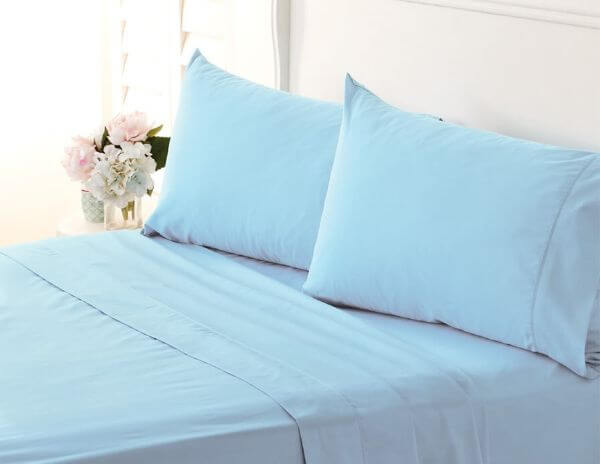When it comes to choosing the perfect sheets for a good night’s sleep, two popular contenders often dominate the market: polyester and cotton sheets. Both materials have their own unique characteristics, benefits, and drawbacks.
In this article, we will explore the key factors that can help you make an informed decision about which type of sheet is best suited to your needs. So, let the battle of polyester vs. cotton sheets commence!

Table of Contents
Material Composition
Polyester is a synthetic material derived from petroleum. It is known for its durability and resistance to wrinkles, fading, and shrinkage. Polyester sheets are often blended with other fabrics to enhance their properties. They are relatively low-maintenance and can be machine-washed and dried with ease.
Cotton, a natural fiber derived from the cotton plant, has been a favorite choice for bedding for centuries. It offers breathability, softness, and a luxurious feel against the skin. Cotton sheets are available in a range of thread counts, with higher counts indicating finer and smoother fabric. They require a bit more care during laundering to prevent shrinkage and wrinkling.
Breathability and Comfort
Polyester sheets tend to be less breathable than cotton sheets, as they are not as adept at wicking away moisture. This can lead to a warmer sleeping experience, making them less suitable for individuals who tend to sleep hot. However, they can be a good option for colder climates or for those who prefer a cozy feel.
Cotton sheets excel in breathability, allowing air to circulate and moisture to evaporate, keeping you cool and comfortable throughout the night. This feature makes cotton sheets ideal for warm climates or for individuals who experience night sweats. Cotton also offers a softer, more luxurious feel against the skin, adding to the overall comfort.
Durability and Maintenance
Polyester sheets are highly durable and resistant to pilling, fading, and stretching. They can withstand frequent washing without losing their shape or color. Polyester is also less prone to wrinkling, making it a convenient choice for those who prefer a low-maintenance bedding option.
Cotton sheets are generally long-lasting, especially if they have a high thread count. However, they may be more prone to pilling and fading over time, particularly if they are of lower quality. Cotton sheets require proper care during washing and drying to maintain their integrity. They may wrinkle easily and may need ironing or pressing to achieve a smooth look.
Environmental Impact
Polyester is derived from non-renewable resources and requires a significant amount of energy and chemicals during production. It is not biodegradable and contributes to microplastic pollution when washed. However, the durability and longevity of polyester sheets can offset their initial environmental impact.
Cotton is a natural and renewable resource, making it a more environmentally friendly choice. However, conventional cotton farming often involves the use of pesticides, herbicides, and large amounts of water. Opting for organic cotton sheets can help minimize the environmental impact and promote sustainable practices.
Conclusion
In the battle of polyester vs. cotton sheets, the ultimate winner depends on your personal preferences and needs. Polyester sheets offer durability, low maintenance, and a cozy feel, while cotton sheets excel in breathability, softness, and a more environmentally friendly profile.
Consider factors such as climate, comfort, durability, and sustainability to make an informed choice. Whichever material you choose, investing in high-quality sheets will undoubtedly enhance your sleep experience and contribute to your overall well-being. Sweet dreams await!

Alex P. Davis has a BA in Interior Design from The New York School of Interior Design and 10 years of experience expertly designing sophisticated interiors.
